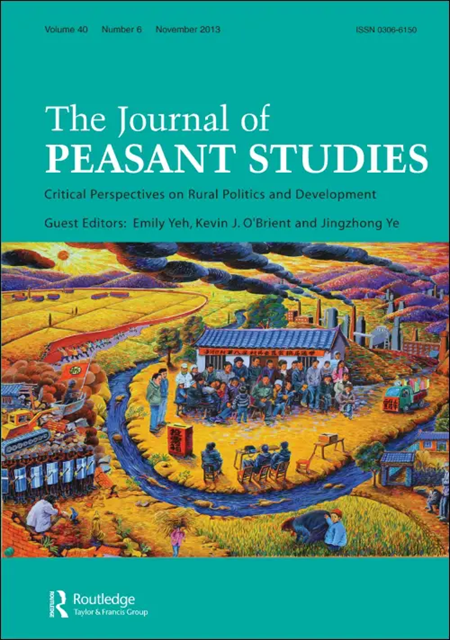农民、吃货和原住民:加拿大的食物主权
IF 4.8
1区 社会学
Q1 ANTHROPOLOGY
引用次数: 207
摘要
本文探讨了食品主权的概念和框架如何被纳入加拿大社会不同部门的食品政策议程,特别是在全国农民联盟、qusambec的Paysanne联盟、加拿大食品安全和土著食品主权运动的工作和话语中。这一分析既强调了概念化粮食主权的挑战,也强调了在不同且往往重叠的尺度上定义涉及粮食主权的包容性政策时的紧张关系。我们批判性地评估食品主权的“多样性统一”原则如何在加拿大的背景下发挥作用,特别关注关于食品主权含义的辩论的政策影响。在审查加拿大使用食品主权语言的广泛参与者的要求时,最明显的是一个共同的目标,即在塑造食品系统方面重新获得公众声音,以及围绕社会正义、环境可持续性和多样性的理想日益趋同。但是,如果粮食主权是关于粮食系统的根本变革,那么在这个国家,它还处于初级阶段。本文章由计算机程序翻译,如有差异,请以英文原文为准。
Farmers, foodies and First Nations: getting to food sovereignty in Canada
This paper examines how the concept and framework of food sovereignty has been incorporated in food policy agendas across diverse sectors of Canadian society, particularly in the work and discourse of the National Farmers Union, Québec's Union Paysanne, Food Secure Canada and movements for Indigenous food sovereignty. This analysis highlights both the challenges to conceptualizing food sovereignty and the tensions in defining inclusive policies that engage with food sovereignty at distinct, and often overlapping, scales. We critically assess how the ‘unity in diversity’ principle of food sovereignty functions in the Canadian context, paying particular attention to the policy implications of debates about the meaning of food sovereignty. What is most evident in examining the demands of a wide range of actors using food sovereignty language in Canada is a shared aim to reclaim a public voice in shaping the food system and a growing convergence around ideals of social justice, environmental sustainability and diversity. But, if food sovereignty is about fundamental transformation of the food system, it is yet in initial stages in this country.
求助全文
通过发布文献求助,成功后即可免费获取论文全文。
去求助
来源期刊

Journal of Peasant Studies
Multiple-
CiteScore
10.50
自引率
17.60%
发文量
99
期刊介绍:
A leading journal in the field of rural politics and development, The Journal of Peasant Studies (JPS) provokes and promotes critical thinking about social structures, institutions, actors and processes of change in and in relation to the rural world. It fosters inquiry into how agrarian power relations between classes and other social groups are created, understood, contested and transformed. JPS pays special attention to questions of ‘agency’ of marginalized groups in agrarian societies, particularly their autonomy and capacity to interpret – and change – their conditions.
 求助内容:
求助内容: 应助结果提醒方式:
应助结果提醒方式:


